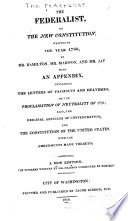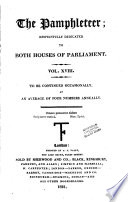 When the legislative and executive powers are united in the same person, or in the same body of magistrates, there can be no liberty; because apprehensions may arise lest the same monarch or senate should enact tyrannical laws, to execute them in a tyrannical... When the legislative and executive powers are united in the same person, or in the same body of magistrates, there can be no liberty; because apprehensions may arise lest the same monarch or senate should enact tyrannical laws, to execute them in a tyrannical...  Documents of the Canadian Constitution, 1759-1915 - Page 140by William Paul McClure Kennedy - 1918 - 707 pagesFull view Documents of the Canadian Constitution, 1759-1915 - Page 140by William Paul McClure Kennedy - 1918 - 707 pagesFull view - About this book
 | 1768 - 478 pages
...magiftrateif there " can be no liberty ; becaufe apprehenSions may arife, left the " fame monarch qr Senate Should enact tyrannical laws, to '? execute them in a tyrannical manner." Now if it Should appear, that, as the houfe of commons has been for fome time constituted, the legislative... | |
 | William Hazlitt - 1809 - 608 pages
...observes, " When the legislative and executive powers are united in the same person, or in the same body of magistrates, there can be no liberty ; because apprehensions...tyrannical laws to execute them in a tyrannical manner. No liberty can exist, if the judiciary power be not separated from the legislative and the executive.... | |
 | William Cobbett - 1810 - 538 pages
...the " legislative and executive powers are '• united in the same person, or in the ' same body of magistrates, there can be ' no Liberty ; because apprehensions...tyrannical laws, to ' execute them in a tyrannical manner; ' and again, there is no Liberty, if the ' judiciary power be not separated from ' tha legislative... | |
 | William Hazlitt - 1810 - 612 pages
...observes, " When the legislative and executive powers are united in the same person, or in the same body of magistrates, there can be no liberty ; because apprehensions...arise lest the same monarch or senate should enact tvrannical laws to execute them in a tyrannical manner. No liberty can exist, if the judiciary power... | |
 | 1810 - 538 pages
...when the " legislative and executive powers are "united in the same person, or in'the " same body of magistrates, there can be " no Liberty'; because apprehensions " may arise," lest the sdttie monarch or " senate should enact tyrannical laws, to " execute them in a tyrannical manner;... | |
 | Alexander Hamilton, James Madison, John Jay - 1817 - 570 pages
...meaning. " When the legislative " and executive powers are united in the same person or body,'' says he, " there can be no liberty, because apprehensions may...tyrannical " laws, to execute them in a tyrannical manner." Again, " Were the power of judging joined with the legislative, the life " and liberty of the subject... | |
 | James Madison, John Jay - 1818 - 882 pages
..." When " the legislative and executive powers are united in the " same person or body," says he, " there can be no " liberty, because apprehensions may arise lest the same tl monarch or senate should enact tyrannical laws, to " execute them in a tyrannical manner." Again,... | |
 | Abraham John Valpy - 1821 - 582 pages
...says, in his " Spirit of Laws," " The judiciary poner ought not to be given to a standing senate, it should be exercised by persons taken from the body of the people, (as at Athens) at certain times of the year, and pursuant to a form and manner prescribed by law, in... | |
 | Charles de Secondat baron de Montesquieu - 1823 - 810 pages
...and executive powers are united in the same person, or in the same body of magistrates, there can he no liberty ; because apprehensions may arise, lest...tyrannical laws, to execute them in a tyrannical manner. Again, there is no liberty, if the judiciary power be not separated from the legislative arid executive.... | |
 | James Madison, John Jay - 1826 - 736 pages
...are united in the same person or " body," says he, " there can be no liberty, because apprehen" sions may arise lest the same monarch or senate should enact...tyrannical laws, to execute them in a tyrannical manner." Again, " Were the power of judging joined with the legislative, " the life and liberty of the subject... | |
| |